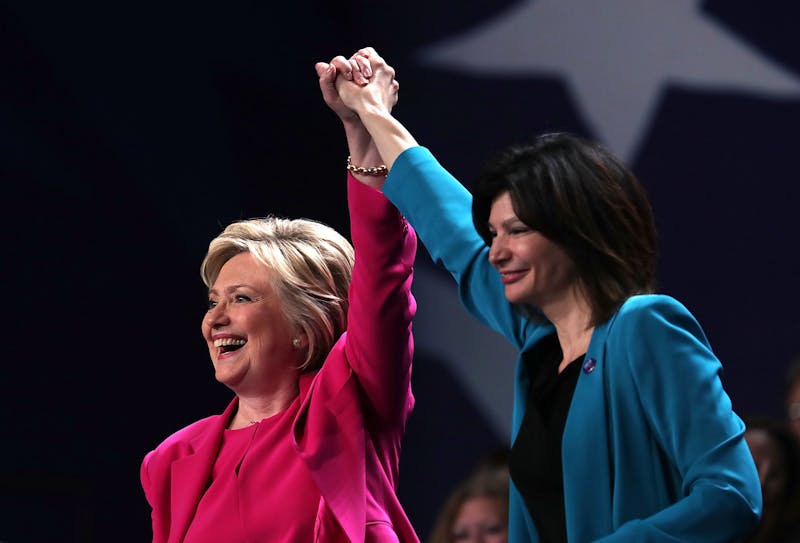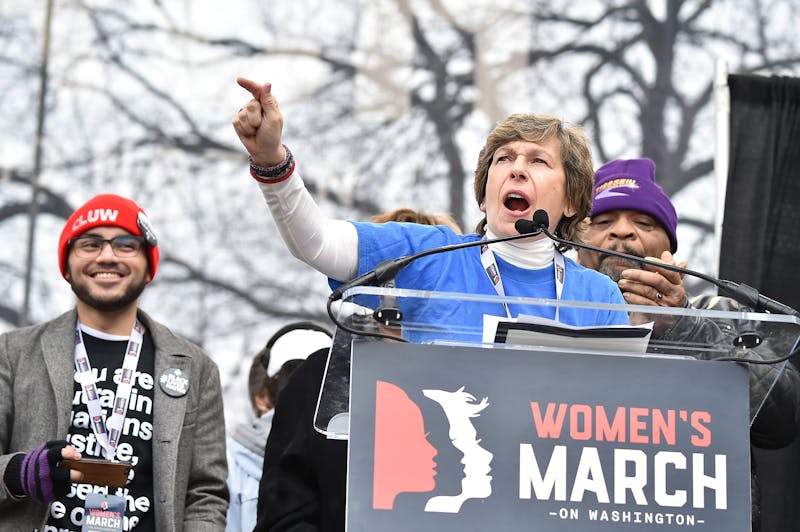President Donald Trump and his advisers probably didn’t expect his choice for education secretary to cause much of a fuss. After all, Rick Perry was tapped to run the Department of Energy, which he once said he wanted to eliminate. Senator Jeff Sessions, who has spent his career attacking voting rights, was up for attorney general. Scott Pruitt, nominated to run the EPA, has sued the agency at least 14 times. Even Ben Carson was offered a job.
And yet, Betsy DeVos turned out to be Trump’s most controversial cabinet pick. It came as a surprise to many in Washington, but it didn’t come out of the blue.
Teachers unions, which have given hundreds of millions of dollars to the Democratic Party over the years, led the fight against DeVos, a billionaire Republican donor and education philanthropist. The National Education Association and the American Federation of Teachers released a joint letter decrying the “two decades she has spent attempting to dismantle the American public school system.”
“[DeVos] and her family have spent millions to promote failed private school vouchers and unaccountable for-profit charter schools while working to destabilize and defund public education,” the unions wrote. “This is a dangerous direction that will do nothing to help our most vulnerable students and will exacerbate glaring opportunity gaps.”
DeVos bolstered the case against her with a disastrous performance at her confirmation hearing. She was confused about basic education policy debates. She showed little familiarity with federal education law, and in some cases wouldn’t commit to enforcing it. In one viral moment, she even said schools might need guns to guard against “potential grizzlies.”
Ahead of DeVos’s confirmation vote, union leaders hammered her on cable news, and the NEA organized a million people to email senators in opposition to her nomination. At least 40,000 called the Capitol through a special switchboard the union set up.
DeVos was nonetheless confirmed by the Senate earlier this month, thanks to a tie-breaking vote from Vice President Mike Pence. Since then, she has only stumbled further, most egregiously after her visit two weeks ago to Jefferson Academy, a public middle school in Washington, D.C. Though she called the school “awesome” at the end of her tour, she later told the conservative publication Townhall that the teachers there were in “receive mode.” “They’re waiting to be told what they have to do, and that’s not going to bring success to an individual child,” she said. “You have to have teachers who are empowered to facilitate great teaching.”
Jefferson Academy promptly took her to school on Twitter.
JA teachers are not in a "receive mode." Unless you mean we "receive" students at a 2nd grade level and move them to an 8th grade level.
— Jefferson Academy (@JATrojans) February 18, 2017
Kaya Henderson, the former chancellor of D.C. Public Schools, also jumped to the school’s defense.
Sorry lady. Tried to give you the benefit of the doubt. But this is so amateur and unprofessional that it's astounding. We deserve better. https://t.co/qOABdRlxi5
— Kaya Henderson (@HendersonKaya) February 18, 2017
Few public school teachers, it seems, are willing to give DeVos the benefit of the doubt. That’s certainly true of Lily Eskelsen García, the president of the National Education Association, the largest union of any kind in America (3.2 million members). “She will get no grace, and she deserves no grace,” Eskelsen García told me on the eve of DeVos’s confirmation vote.
But Randi Weingarten, the president of the American Federation of Teachers (1.6 million members), feels slightly differently. Whereas the NEA is declaring outright opposition, the AFT is cautiously engaging with DeVos, holding out hope for common ground. Weingarten, who has spoken with DeVos over the phone, has agreed to visit a non-traditional “choice school” with her. “You have to talk, and you have to engage,” Weingarten told me.
These divergent approaches to DeVos at the beginning of her tenure mirror a broader divergence on the left—from Democrats on Capitol Hill to progressive activists across America—about how to approach the Trump administration: with unequivocal resistance, or a willingness to compromise?
Just two days into DeVos’s tenure, she called Weingarten and left a voicemail saying she wanted to talk. It took their offices a few days to work out logistics, but they finally spoke last Tuesday—for precisely eleven minutes, by Weingarten’s account. In an interview, Weingarten told me the conversation was “very workmanlike.” DeVos asked if the two could find areas of agreement, and Weingarten was “very frank and blunt about the need to support public education.”
Ultimately, they struck a deal: DeVos would visit a public school with Weingarten, and Weingarten would go to a non-traditional “choice school” with DeVos. The details of these visits are now being worked out.
I asked Weingarten whether she could really find common ground with DeVos, who has long bankrolled failed free-market school reforms. “I have no idea,” Weingarten said. But she’s committed to engaging with DeVos, so the education secretary has no excuse to ignore her or the causes she cares about. “Forcing her to actually see what goes on, walking the walk of teachers and parents and students—I see that as an act of resistance,” Weingarten said.

Eskelsen García is resisting differently. “There will be no relationship with Betsy DeVos,” she told Politico earlier this month. And the NEA leader has held true to her word. In a blog post last Friday, she wrote, “Betsy DeVos called me the other day saying we should talk. But this seems premature. I’m still struck by the lack of clear answers she gave the public at her Senate hearing.” Eskelsen García replied to DeVos with a letter, which she’s since made public, asking for answers to four questions that DeVos ducked during her confirmation process:
1. Do you agree that all schools receiving public dollars must be held to the same accountability and transparency standards?
2. Will you agree not to privatize funding for Special Education or Title I?
3. Will you stand with educators and protect our most vulnerable students from discrimination, including LGBT students, immigrant students, students of color, girls and English language learners?
4. Will you focus, as educators are focused, on the civil rights of all children, regardless of their zip code, by challenging the inequities so many face in equal access to programs, services and support?
“For us, there is a wrong answer to these questions,” Eskelsen García wrote. “Privatizing and profiting from public education has not moved us toward equity, equal access, non-discrimination, and opportunity for all students. NEA members will never waver in our determination to create a system that works for ALL children. Educators, students, and parents deserve to know that the U.S. Secretary of Education will do the same.”
Weingarten says she applauds Eskelsen García for demanding answers. She sent her own letter to DeVos last week, but it was as welcoming as it was admonishing—inviting DeVos to learn more about the successes and challenges of public education in America, and expressing hope for the secretary to have a change of heart.

“Instead of continuing on a path of undermining public schools, we urge you—indeed challenge you—to take the more responsible path—to do the hard work that your oath of office as secretary of education requires,” Weingarten wrote. “Demonstrate that you take seriously the responsibility that the Senate bestowed on you, not through photo ops or sound bites, but by responding in a real and thoughtful way to what parents and teachers need to strengthen our public schools for the students who attend and need them.”
Thus far, this divergence between the NEA and the AFT—which often work in tandem, and once nearly merged—remains subtle. Neither union is identifying potential areas of collaboration with DeVos, and undoubtedly they’ll both oppose her if she continues her support for vouchers and unregulated charters. Still, I asked Weingarten whether she thought Eskelsen García was doing exactly what she worries about—giving DeVos an excuse to ignore union concerns. “I’m talking about what we’re doing,” Weingarten said. “Lily is my sister, and I love her dearly.” She stressed that the NEA and the AFT have “the same intent,” though she allowed, “We’re approaching it differently.”
The NEA sounds like it’s foreclosing future cooperation with DeVos. Last week, I asked how far Eskelsen García would take her “no relationship” pledge. Would she meet with DeVos? Would they talk at all? Does she think any common ground is possible? She responded with this statement:
Can I see myself having a working relationship with someone who does not share our intrinsic value that all students deserve the opportunity to succeed? That answer is no, nor will we stop advocating on behalf of our members and their students to ensure that all children, regardless of ZIP code, have the opportunity for a public-school education that inspires them and nurtures their talents and abilities.
It’s not surprising Weingarten would be a bit more open to dialogue than Eskelsen García. As New York magazine’s Jonathan Chait wrote last year, the AFT president is “a pragmatic figure who has often compromised with reformers.” He added, “For her moderation, Weingarten has often had to fend off more radical forms of resistance. The National Education Association has attacked education reform more vociferously than Weingarten has.”
American Enterprise Institute scholar Rick Hess, a leading conservative voice in education policy, thinks this is admirable. He praised Weingarten for agreeing to tour schools with DeVos.
“I think it’s smart. It’s responsible. It’s what leaders are supposed to do,” he said. “Refusing to talk to somebody is something I expect more of middle schoolers than of the leadership of organizations.”
Not everyone in the AFT is in agreement. Arthur Goldstein, a Weingarten critic on the executive board of the union’s New York City affiliate, United Federation of Teachers, told me that working with DeVos is probably futile.
“I don’t think Randi Weingarten is going to persuade Betsy DeVos of anything whatsoever, but I hope I’m wrong,” said Goldstein, who teaches at Francis Lewis High School in Queens and writes for The New York Daily News and his blog. He called DeVos “a fanatical ideologue.”
The left’s outrage over DeVos was all the more surprising given that, as cabinet positions go, the education secretary’s power is relatively limited. “Liberals’ biggest worry about DeVos, aired at the rallies to oppose her and the hundreds of thousands of calls to senators, is that she would ‘destroy’ public education,” Vox’s Libby Nelson recently wrote. “It will be hard for DeVos to make changes that big on her own. Even a modest school voucher program will face a tough battle to become law.”
But DeVos will be able to steer education policy in more subtle ways, Nelson noted. She can go easy on for-profit colleges, choose not to aggressively enforce the Individuals With Disabilities Education Act, amend sexual assault policy to empower accused students, deemphasize the Obama administration’s focus on racial disparities in discipline, and undo protections for transgender students. (on Wednesday, The New York Times reported that the latter is in the works, albeit over DeVos’s objections).
Perhaps, in meeting with DeVos, Weingarten is hoping to wield influence over these potential moves. Touring a couple of schools together hardly suggests policy agreement. If nothing comes of it, Weingarten’s early willingness to engage could make her a more authoritative critic of DeVos down the line.
The risk, however, is that these overtures to DeVos will alienate the segment of her union membership that prefers all-out opposition. Perhaps that’s why Weingarten stressed that her engagement with the education secretary has been very limited.
“We had one conversation,” she reiterated near the end of our interview. “It was eleven minutes long.”
